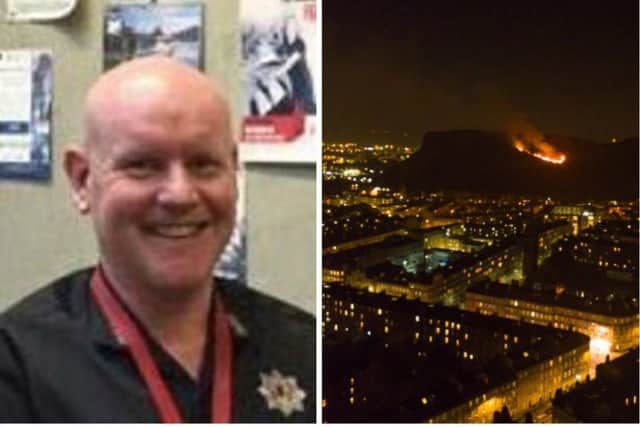Arthur’s Seat gorse fire was ‘one of most challenging’ in senior officer’s career
This article contains affiliate links. We may earn a small commission on items purchased through this article, but that does not affect our editorial judgement.
and live on Freeview channel 276
The Scottish Fire and Rescue Service (SFRS) has also refused to rule out that the large gorse fire by Arthur’s Seat was started by a cigarette.


Fire crews raced to the scene to scene at 6.30pm on Tuesday night to tackle ferocious flames which were visible across Edinburgh.
Advertisement
Hide AdAdvertisement
Hide AdAbout 800 square metres of gorse was left scorched by the fire, which was extinguished after 15 hours.
And nearly 200 calls were made to the Scottish Fire and Rescue Service within the first two hours, as four appliances and a specialist Polaris all-terrain vehicle were called to fight the flames.
‘It may have been a discarded cigarette’


A cause for the fire has yet to be distinguished, but one eyewitness told the Evening News they spotted a sightseer smoking shortly next to the gorse bushes shortly before the fire ignited.
The SFRS stressed carelessly discarded cigarettes could be a cause.
Advertisement
Hide AdAdvertisement
Hide AdMatt Acton, SFRS group manager and the senior officer at the incident, told the Evening News: “We’ve not got to the bottom of the cause yet.
“With the warm weather there were a lot of people in the area last night. It may have been from a discarded cigarette, which can quickly escalate to a fire like last night. We’ve not ruled anything out at this stage.
“We would ask people to remain vigilant and to think carefully of their actions and the consequences if they are introducing an ignition source like a cigarette into a rural area. They need to dispose of them very carefully.
Challenging Location
The overnight fire presented a number of challenges to the fire service including accessibility, lack of light, safety, water supply and the fire rapidly spreading.
Advertisement
Hide AdAdvertisement
Hide AdMr Acton said crews had to act quickly to first of all to control the fire to prevent it from spreading.
He said: “The difficulty we faced was that the fire was on a steep incline on really unstable ground and so our priority was to keep the public safe and consider the safety of our fire crews, whilst making an attack on the fire.
“It was too risky to put firefighters on the hillside in the dark which influenced how we could tackle the fire.
“Teamwork becomes key and we look at what we can achieve with the equipment available and formulate a tactical plan.
Advertisement
Hide AdAdvertisement
Hide Ad“The conditions are arduous with the intense heat of a wildfire. The changes in wind direction also pose problems so you have to be mindful to maintain safe exit routes.”
The fire crews broke down the blaze into two sectors - one at the base of the hill with hose lines and another on Radical Road where a crew with the 4x4 vehicle and fogging unit were able to help contain and control the fire by 9pm.
But Mr Acton, who was in charge of the operation until midnight, said it was one of the most challenging wildfires he had come across in his career and was proud of the multi-agency response.
The fire was eventually extinguished in the early hours of Wednesday morning, with fire crews dealing with hotspots before vacating the scene at 9.40am.
Advertisement
Hide AdAdvertisement
Hide AdMr Acton added: “With tall trees nearby, it was important for us to stop the fire from spreading there so we dampened down that particular area.
“I’ve dealt with a number of fires on Arthur’s Seat and last night’s was certainly up there in terms of a challenge. Working in darkness on a hillside presents us with its own challenge.
“The 4x4 really came into its own last night and proved to be an essential piece of equipment, transporting firefighters and sufficient water to areas we would usually be unable to reach.
“It was a tremendous effort from our fire crews and I’m pleased to report there were no injuries to the public or firefighters and the fire was successfully extinguished, so it was a huge success.
Advertisement
Hide AdAdvertisement
Hide Ad“Huge credit goes to the park rangers, Police Scotland and the local authority in helping to bring the incident to a safe conclusion.”
Climate Change
As the warm and dry weather continues, so too does the risk of wildfires.
The average maximum daytime temperature in the Capital this month is a balmy nine degrees - more than three degrees higher than normal.
And the city’s plants have been left parched with nearly half - 43 per cent - of the expected rainfall at this time of year.
Advertisement
Hide AdAdvertisement
Hide Ad“We’ve been having an unseasonably mild spell these last couple of weeks with lots of dry weather,” said Met Office meteorologist Bonnie Diamond.
“That’s down to a high pressure over the continent bringing settled weather across the UK,” she added.
Friends of the Earth Scotland director, Dr Richard Dixon, said: “Wildfires like this one on Arthur’s Seat are made much more likely because of climate change.
“The U.K is experiencing extremely high temperatures for winter with records being broken in England and Wales in the last week.
Advertisement
Hide AdAdvertisement
Hide Ad“When combined with the limited rainfall we’ve seen drying out the ground and gorse, unfortunately, the stage is set for this kind of incident.
“This unseasonable weather will endanger wildlife and plants, as well making life much harder for farmers who need weather they can rely on.”
Join our Facebook group Our Edinburgh to share images and news from and around the Capital